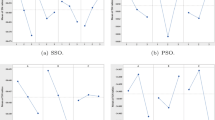Abstract
A decomposition based hybrid optimization algorithm is presented for large-scale job shop scheduling problems in which the total weighted tardiness must be minimized. In each iteration, a new subproblem is first defined by a simulated annealing approach and then solved using a genetic algorithm. We construct a fuzzy inference system to calculate the jobs’ bottleneck characteristic values which depict the characteristic information in different optimization stages. This information is then utilized to guide the process of subproblem-solving in an immune mechanism in order to promote the optimization efficiency. Numerical computational results show that the proposed algorithm is effective for solving large-scale scheduling problems.
Similar content being viewed by others
References
Adams J, Balas E, Zawack D (1988) The shifting bottleneck procedure for job shop scheduling. Manage Sci 34(3):391–401
Bassett MH, Pekny JF, Reklaitis GV (1996) Decomposition techniques for the solution of large-scale scheduling problems. AIChE J 42(12):3373–3387
Braune R, Wagner S, Affenzeller M (2007) Optimization methods for large-scale production scheduling problems. Lecture notes in computer science, vol 4739. Springer, Berlin, pp 812–819
Byeon ES, Wu SD, Storer RH (1998) Decomposition heuristics for robust job-shop scheduling. IEEE Trans Robot Autom 14(2):303–313
Cheng R, Gen M (1996) A tutorial survey of job-shop scheduling problems using genetic algorithms—Part I: representation. Comput Ind Eng 34(4):983–997
Cheng R, Gen M (1999) A tutorial survey of job-shop scheduling problems using genetic algorithms—Part II: hybrid genetic search strategies. Comput Ind Eng 36(2):343–364
Croce FD, Tadei R, Volta G (1995) A genetic algorithm for the job-shop problem. Comput Oper Res 22(1):15–24
Dell’Amico M, Trubian M (1993) Applying tabu search to the job-shop scheduling problem. Ann Oper Res 41(3):231–252
Essafi I, Mati Y, Dauzère-Pérès S (2008) A genetic local search algorithm for minimizing total weighted tardiness in the job-shop scheduling problem. Comput Oper Res 35(8):2599–2616
Jain AS, Meeran S (1999) Deterministic job-shop scheduling: Past, present and future. Eur J Oper Res 113(2):390–434
Jang JSR, Sun CT, Mizutani E (1997) Neuro-fuzzy and soft computing. Prentice-Hall, Englewood Cliffs
Jiao L, Wang L (2000) A novel genetic algorithm based on immunity. IEEE Tran Syst Man Cybern Part A 30(5):552–561
Kolonko M (1999) Some new results on simulated annealing applied to the job shop scheduling problem. Eur J Oper Res 113(1):123–136
Laarhoven PJM, Aarts EHL, Lenstra JK (1992) Job shop scheduling by simulated annealing. Oper Res 40(1):113–125
Lenstra JK, Kan AHGR, Brucker P (1977) Complexity of machine scheduling problems. Ann Discrete Math 7:343–362
Liu M, Hao JH, Wu C (2008) A prediction based iterative decomposition algorithm for scheduling large-scale job shops. Math Comput Model 47(3–4):411–421
Luh PB, Gou L, Zhang Y, Nagahora T, Tsuji M, Yoneda K, Hasegawa T, Kyoya Y, Kano T (1998) Job shop scheduling with group-dependent setups, finite buffers and long time horizon. Ann Oper Res 76:233–259
Mönch L, Schabacker R, Pabst D, Fowler JW (2007) Genetic algorithm-based subproblem solution procedures for a modified shifting bottleneck heuristic for complex job shops. Eur J Oper Res 177(3):2100–2118
Nowicki E, Smutnicki C (1996) A fast taboo search algorithm for the job shop problem. Manage Sci 42(6):797–813
Panwalkar SS, Iskander W (1977) A survey of scheduling rules. Oper Res 25(1):45–61
Park MW, Kim YD (1998) A systematic procedure for setting parameters in simulated annealing algorithms. Comput Oper Res 25(3):207–217
Singer M (2001) Decomposition methods for large job shops. Comput Oper Res 28(3):193–207
Sun D, Batta R (1996) Scheduling larger job shops: a decomposition approach. Int J Prod Res 34(7):2019–2033
Tang L, Luh PB, Liu J, Fang L (2002) Steel-making process scheduling using Lagrangian relaxation. Int J Prod Res 40(1):55–70
Vepsalainen AP, Morton TE (1987) Priority rules for job shops with weighted tardy costs. Manage Sci 33(8):95–103
Wu SD, Byeon ES, Storer RH (1999) A graph-theoretic decomposition of the job shop scheduling problem to achieve scheduling robustness. Oper Res 47(1):113–124
Zhang CY, Li PG, Rao YQ, Guan ZL (2008) A very fast TS/SA algorithm for the job shop scheduling problem. Comput Oper Res 35(1):282–294
Zhou H, Cheung W, Leung LC (2008) Minimizing weighted tardiness of job-shop scheduling using a hybrid genetic algorithm. Eur J Oper Res. doi:10.1016/j.ejor.2007.10.063
Author information
Authors and Affiliations
Corresponding author
Rights and permissions
About this article
Cite this article
Zhang, R., Wu, C. A hybrid approach to large-scale job shop scheduling. Appl Intell 32, 47–59 (2010). https://doi.org/10.1007/s10489-008-0134-y
Received:
Accepted:
Published:
Issue Date:
DOI: https://doi.org/10.1007/s10489-008-0134-y




